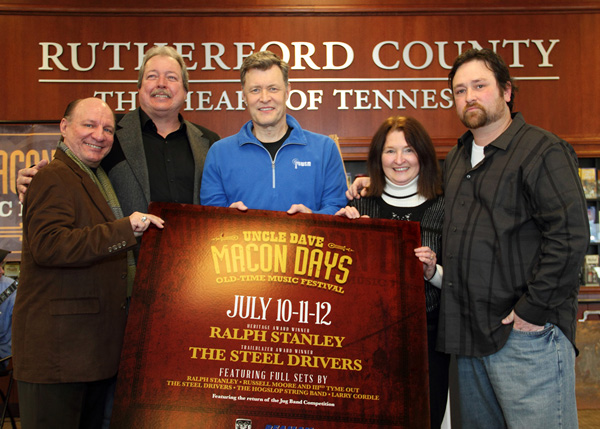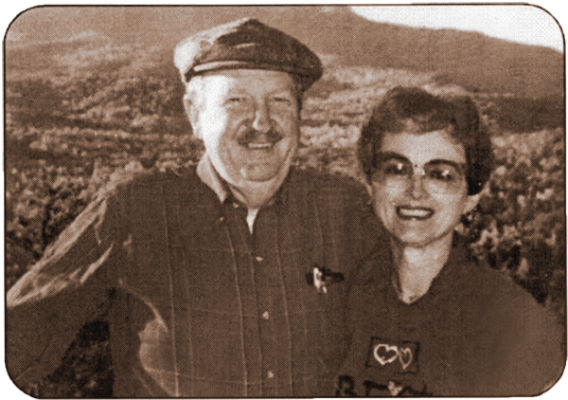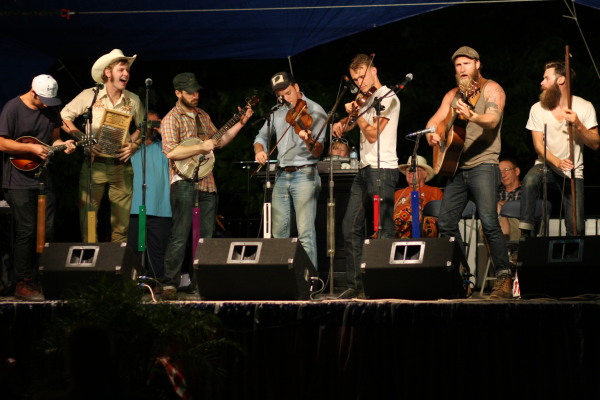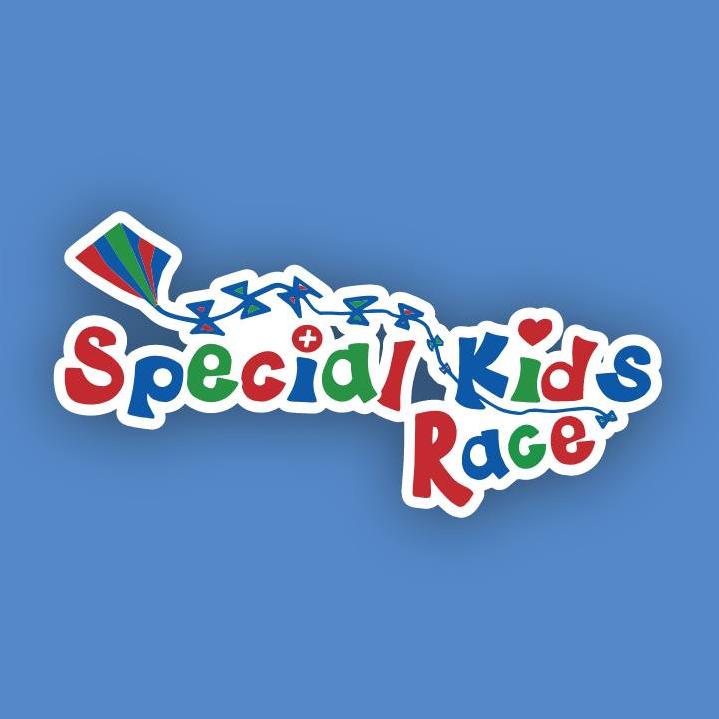
(From left) Kevin McNulty, Russell Moore —who will be playing before Ralph Stanley— Bill Cody of WSM 650, Gloria Christy and her son, Ben Wilson.
Originally made from a gourd covered with groundhog’s hide, goat’s skin or, sometimes, cat skin, the “banja or banjars” (today’s banjo) has become a part of our country’s heritage. The story of the banjo, from its African American roots to the sound of its plucked strings ringing from cabins in the dark hollows of the Appalachians, is about America’s people. The natural tone of the banjo is happy and joyous—its lighthearted sound could peel the bark off a tree.
In the early 19th century, the instrument was an oddity, denied respect in most music circles. In the 20th century, with the emergence of the exciting “claw-hammer” of “frailing” performance styles of Uncle Dave Macon, it became a reputable standard during the early days of the WSM Barn Dance and Grand Ole Opry.
On Oct. 19, 1857, the first banjo contest was held in, of all places, New York City. The contest was organized by Charles Morrell, a banjo maker. The first and only prize was $100 (equivalent to well over $2,000 today). It was held in the Old Chinese Assembly Rooms at No. 539 on Broadway. There were three judges, a custom still followed today in banjo contests around the country. Each player was to play five tunes: a waltz, one schottische, one polka, one reel and one jig. Twenty players entered the contest, which typically drew a packed house. Years later, in the July 1890 issue of the Banjo and Guitar Journal, Mr. Morrell documented the historical event, saying that the audience went wild, mesmerized by the colorful banjo players: “I thought that the roof would fall off!”
Charles Plummer was announced the winner—“The Champion Banjoist of America.” He played his five tunes in a continuous medley, running one tune into another until he finished. Charles Morrell took his banjo playing and contest idea to the West Coast, teaching hundreds of Californians to play even before the Civil War.
It is fair to assume that many contemporary banjo contests have been influenced by Mr. Morrell’s idea today—Galax, Virginia’s Old Fiddler’s Contest (featuring banjo competitions), the Appalachian String Band Festival in Clifftop, W.V., or the Topanga Canyon Banjo Contest in Aurora Hills, Calif.—or even our own Uncle Dave Macon Days. Banjo contests are great fun. Over the years, the contests have almost become a way of life for some players. Here is a story of the humble beginnings of Uncle Dave Macon Days, one that happened in my fourth year as director.
By 1987, after starting as a one-day banjo pickin’ contest in 1978, Uncle Dave Macon Days had become one of the Southeast’s fastest-growing old-time music festivals. The 1987 event marked the 11th Annual Uncle Dave Macon Days; the previous year, Congress had declared the festival to be the official site of the National Championships for the old-time dance styles of clogging and buck dancing. In addition, Uncle Dave’s “claw-hammer banjo” performing style had achieved prominence as the festival was also declared the National Championship in old-time banjo performance. So, 1987 was the first year that these national competitions would be featured as a part of the festival. Clearly, Uncle Dave Macon Days was carving out its own popular niche beyond loyal and regional enthusiasts to include musicians and dancers across America.
When I first volunteered to help in the summer of 1982, I soon found that Jesse Messick, the founder of Uncle Dave Macon Days, was a man of remarkable character and conviction. He had the ability to see the best in an individual and encourage them beyond their own perception of themselves. In 1984, Jesse had asked me to direct the festival. In those days, I was grieving from a broken marriage and was overwhelmed with feelings of inadequacy and failure. Somehow, in his wisdom, Jesse persuaded me to look beyond my circumstances and rely on God for the results in every facet of my life. This included how a festival was to be developed and directed. Up until then, I really did not think God cared about those kinds of details in everyday life.
Jesse, a prominent businessman, owned Messick Family Pharmacy, which had been a fixture on the Murfreesboro Public Square, and served as a county commissioner completely devoted to his community, particularly the downtown area. Above all, Jesse loved the music and the comedy of the early days of the Grand Ole Opry. In 1977, after being involved in an event that inspired Uncle Dave Macon Days called the “Homespun Days,” Jesse came up with the idea to create an event featuring the music of those early Opry days. It was his hope that this event would bring a family-friendly activity to the Square, drawing interest back to the downtown area, which had succumbed to the impact of outlying shopping centers. Jesse’s dream was to stimulate the economy and vitality of the downtown by establishing an event around the Opry’s first superstar, Uncle Dave Macon. Uncle Dave, one of Rutherford County’s most flamboyant figures and a lifelong resident, had died in 1952.
By 1987, through Jesse’s leadership and guidance, the festival organizers had truly bonded. Jesse’s “empowerment technique” was simply to affirm one’s gifts and allow them to flourish in the context of working in a group initiative on the festival. As the 1987 festival approached, we all realized that the Uncle Dave Macon Days Committee was more than just a group of organizers. Not only had we become a national competition, but with Jesse’s leadership, we had flourished into an extended family. Indeed, we were truly a blended family, each one with their own unique gifts.
Jesse’s life-path of sacrificial faith was an eye-opener, the likes of which I had never experienced. Although I had been festival director since 1984, and prone to being a “control freak,” I found this kind of behavior unsettling. How could one surrender everything to God, including a music festival? He always reassured me that God was a like a kind father who really cared about the assignments that were given to us. “Total surrender to God” seemed so unrealistic, even irresponsible, like a pious evasion of personal responsibility.
Many encircling circumstances threatened to stifle our efforts that year. If Uncle Dave Macon Days was going to happen in 1987, it was clearly going to take more than Jesse, myself as director, or any of the rest of us on the committee. Similar to this year, among other obstacles was the overpowering heat and drought that had plagued Middle Tennessee that year. As I recall, it had not rained significantly since May.
As Saturday morning of the competition began, the sun beat down relentlessly on the pavement of the Public Square. Waves of heat blurred one’s sight when looking out from the splotches of shade beneath the immense trees on the Courthouse lawn. A few pickers would brave the elements, and only a few onlookers ventured out to endure what was to be a scorcher of an afternoon.
During the opening ceremonies on Friday, Jesse’s pastor had led the smattering of attendees in a brief prayer. Among his simple petitions to the Lord, he fervently prayed for rain. I remember thinking as I gazed up into the blazing, clear, cloudless blue sky, “That’s nice, but not this weekend, okay, Lord? It’s not going to fit into the success of the festival.”
Out of nowhere in the summer haze of that Saturday afternoon, like sheep in a vast field of blue, appeared a clouded canopy. Then, as if a towering angel began to flap her dewy wings, a sweet breeze breathed in a delightful afternoon shower which swept across the Square, bringing soothing cool relief over the entire downtown area. Moistened and refreshed, the air was sparked with a charge of excitement and attraction. Within a short time after the rain, an enormous crowd converged. Attendance kept growing and growing, and by Saturday evening, we had the largest crowd ever at Uncle Dave Macon Days. It was the first year that the crowd expanded outside the courtyard and onto Main Street, and it was apparent that the event would soon outgrow the Square. In 1989, we moved the festival to Cannonsburgh Village, right off the Public Square.
As it happened, that would be Jesse’s last Uncle Dave Macon Days. He died in the spring of 1988. Beyond his passing, Jesse left a legacy of faith in all of us who have volunteered for the past 38 years with this remarkable gift of love to our community. Year after year, I have learned that the festival is an opportunity to discover God’s power as well as a way to honor and reflect his kindness and abundance.
Recently, we have discovered that many of our young prodigies have gone on to careers in music, playing with such talents as Vince Gill, Ricky Skaggs, Rhonda Vincent, and even last year’s Heritage Award Winners, Dailey and Vincent. Many of our former Uncle Dave Macon Days dancers are now professionals on the Grand Old Opry. I am still amazed how God has used this festival to show His grace and goodness.
Now, after more than 30 years as director of Uncle Dave Macon Days, I have passed the festival’s leadership on to my son, Ben Wilson. Under his leadership, and that of talented others who have grown up in the festival’s organization, Uncle Dave Macon Days will undoubtedly be sustained and will evolve into a new level of greatness. What a blessing to have such leadership skills in my son, right under my feet! His new role as director is for such a time as now. With banjos being one of the top-selling instruments across the U.S., the roots-music movement continues to expand, sweeping across our land and helping to preserve what is special about America’s musical story. Uncle Dave Macon Days is a part of sharing this legacy with the next generation.
All who are involved continue to face the challenges of organizing an event run primarily by volunteers. Every year, there is a unique set of circumstances that we must trust to God. Together, those of us who organize and operate Uncle Dave Macon Days collectively rise to meet the challenge and take confidence that, in some small way, we may serve to advance God’s Kingdom here in Rutherford County.
We thank God as He continues to bless our efforts. Uncle Dave Macon Days is noted as one of the South’s premier music festivals, with an impact locally of $1.2 million, according to a study conducted by Middle Tennessee State University Business in 2014. In 2015, the Southeastern Tourism Society honored Uncle Dave Macon Days as the one of the Top 20 events in the Southeast for the month of July.
After 38 years, another step of faith is being required. In recent years, we have extended the vision and mission of Uncle Dave Macon Days to include a year-long music education program in the schools, named “Macon Music Education.”
In the fall of 2013, beginning at Bradley Academy in Murfreesboro, Macon Music Education offered a unique experience touching the lives of children in the classroom with the “Music Through the Decades” pilot program. Most children have never heard the music originating from Tennessee or had an up-close-and-personal experience with professional old-time and bluegrass musicians.
Says Kim Fowler, the principal of Bradley Academy for Arts Integration, “Our children’s cultural and artistic lives have been enriched through the Macon Music series. Many of our students would never have experienced the rich cultural and musical history of Tennessee had they not been given this delightful and immediate opportunity through Macon Music in the schools.”
Macon Music Education is an extension of the Uncle Dave Macon Days Festival; a portion from the gate proceeds from the Uncle Dave Macon Days festival now directly benefits Macon Music Education throughout the year. It is an extension of the organization’s mission: Preserving Yesterday’s Music for Today and Tomorrow!
Linda Gilbert, Director of Murfreesboro City Schools, adds that “the Macon Music Education experience allowed the children to link all of those elements together into the history of this state, seeing more clearly their heritage. Macon Music was a 2015 nominee for the Governor’s Arts Award. Opportunities experiencing live music would never happen without this program.”
With this in mind for the 2014–15 school year, the Macon Music Education’s Music Through the Decades program featured “The Days of Uncle Dave, 1920s to 1930s,” covering the early days of the Grand Ole Opry and the radio technology at Woodbury Grammar School in Cannon County.
A summer day-camp will be held at Hobgood Elementary prior to the 2015 festival in July. A partnership with Middle Tennessee State University will coordinate, facilitate and implement the Music Through the Decades curriculum, which teaches regional culture and music heritage in additional Middle Tennessee Schools.
This year, the 38rd Annual Uncle Dave Macon Days Old-time Music and Dance Festival will begin July 10. Gates open at 8 a.m. with the Matilda Macon Folk Arts Village, Dave Macon Artisan’s Court and Marketplace. The old-time musical and dance competitions begin at 1 p.m. on the Main Stage and the new Dixie Dew Drop Stage. New this year are three featured “Concerts at Sunset” beginning with Russell Moore and IIIrd Tyme Out at 6 p.m., followed by the 2015 Heritage Award winner, Dr. Ralph Stanley and the Clinch Mountain Boys.
The festival continues July 11 with the famed motorless parade down historic East Main to Cannonsburgh at 10 a.m. and the national old-time dance and banjo competitions. On Saturday evening, the Concert at Sunset will feature the Hog Slop String Band and the presentation of the 2015 Trail Blazer Award winners, the Steeldrivers 7 p.m. On July 12 the festival entertains with the Gospel showcase, Wilson Bank and Trust Antique Car Show and Community Service Fair. The festival concludes with a Sunday with Kristina Craig and Exit 148 and the final Concert at Sunset with Larry Cordell and Lonesome Standard Time.
For more information about the 2015 Uncle Dave Macon Festival, visit uncledavemacondays.com or email sponsorudm@gmail.com.
Thank you, Jesse, for teaching us faith in the context of an old-time music festival. If you have not experienced Uncle Dave Macon Days, come, take a break from your routine, and enjoy. Guaranteed, you will feel the enthusiasm, revive old friendships, and make new ones. Needless to say, you will be changed by the warm sounds of traditional music on the banks of Lytle Creek in Cannonsburgh Village.















